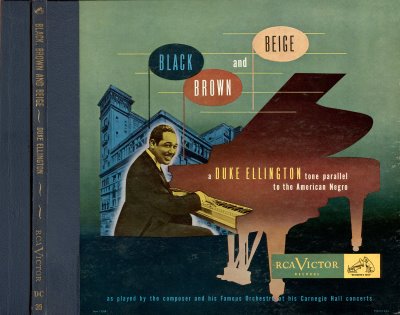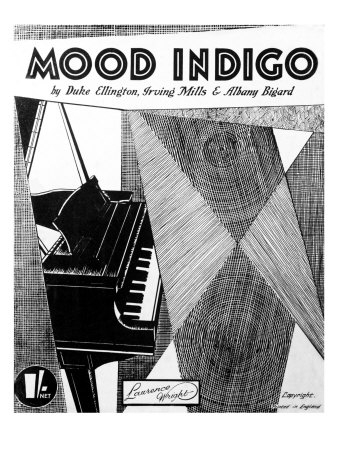“It would be difficult to prove that saints do not enjoy the trouble they make.”
William Maxwell, Ancestors: A Family History
Archives for 2012
TT: Found poem
 These are the working titles of the thirteen chapters of Mood Indigo: A Life of Duke Ellington. (I say “working” because even though I no longer expect to change them, you never know.) As was the case with the chapter titles of Pops: A Life of Louis Armstrong, they are all phrases that were spoken by Ellington at one time or another in his life:
These are the working titles of the thirteen chapters of Mood Indigo: A Life of Duke Ellington. (I say “working” because even though I no longer expect to change them, you never know.) As was the case with the chapter titles of Pops: A Life of Louis Armstrong, they are all phrases that were spoken by Ellington at one time or another in his life:
• “I want to tell America”
• “I just couldn’t be shackled”
• “Soft and gut-bucket”
• “My ear makes my decision”
• “A higher plateau”
• “The way the president travels”
• “The eyes in the back of my head”
• “The sea of expectancy”
• “We didn’t believe in categories”
• “More a business than an art”
• “I was born in 1956”
• “Fate’s being kind to me”
• “That big yawning void”
I think they make a rather nice little poem, don’t you?
TT: Snapshot
Kenneth Tynan interviews Laurence Olivier in 1966:
(This is the latest in a series of arts-related videos that appear in this space each Monday and Wednesday.)
TT: Almanac
“Honors go to those who want them.”
Michael Oakeshott (quoted in Paul Franco, Michael Oakeshott: An Introduction, courtesy of Tim Hulsey)
TT: Almanac
“What we, or at any rate what I, refer to confidently as memory–meaning a moment, a scene, a fact that has been subjected to a fixative and thereby rescued from oblivion–is really a form of storytelling that goes on continually in the mind and often changes with the telling. Too many conflicting emotional interests are involved for life ever to be wholly acceptable, and possibly it is the work of the storyteller to rearrange things so that they conform to this end. In any case, in talking about the past we lie with every breath we draw.”
William Maxwell, So Long, See You Tomorrow
TT: At full tilt
 I went at Mood Indigo: A Life of Duke Ellington with hammer and tongs last week, and by the time I was done, I’d written the first 16,000 words of the fifth chapter, which will take Ellington from 1929 to 1933.
I went at Mood Indigo: A Life of Duke Ellington with hammer and tongs last week, and by the time I was done, I’d written the first 16,000 words of the fifth chapter, which will take Ellington from 1929 to 1933.
Appropriately enough, one of the things that I wrote was a discussion of “Mood Indigo” itself. I especially like this paragraph:
Ellington is said to have thought “Old Man Blues” to be his best composition yet. It’s easy to see why he was so pleased with it, but “Mood Indigo,” recorded two months later by a seven-piece combo drawn from the band, is even more inspired, and unlike “Old Man Blues,” which was rarely heard in later years, it became a permanent and beloved part of the band’s working repertoire. A nocturne whose “exquisitely tired and four-in-the-morning” atmosphere (in Constant Lambert’s phrase) he would evoke time and again, “Mood Indigo” opens with a three-part chorale intoned by muted trumpet, muted trombone, and low-register clarinet, the same combination that André Previn had in mind when he marveled at how “Duke merely lifts his finger, three horns make a sound, and I don’t know what it is.” Then Barney Bigard steps out from the ensemble to play the tune, a rich and shapely melody backed by the tick-tock strokes of Freddy Guy’s banjo and the smooth, steady walk of the rest of the rhythm section. Arthur Whetsel plays a delicate solo and Ellington flutters gracefully through a lacy four-bar piano interlude, after which the chorale is repeated as the record spins to a close. Two months later the full band re-recorded “Mood Indigo,” but Ellington knew better than to tamper with the scoring of the introductory chorale. It is as simple–and unforgettable–as a proverb.
I’m feeling good about the book again. Can you tell?
* * *
A Snader Telescriptions film of “Mood Indigo” performed by the Ellington orchestra in 1951. The clarinet solo is by Jimmy Hamilton. The arrangement, by Billy Strayhorn, is significantly different from the one described above:
Paul Newman and Sidney Poitier “play” “Mood Indigo” in the 1961 film Paris Blues. Newman’s trombone was dubbed by Murray McEachern. The onscreen pianist is Aaron Bridgers, Billy Strayhorn’s first lover:
TT: Just because
Elaine May and Mike Nichols appear in a commercial for General Electric:
(This is the latest in a series of arts-related videos that appear in this space each Monday and Wednesday.)
TT: Almanac
“There is no great harm in the theorist who makes up a new theory to fit a new event. But the theorist who starts with a false theory and then sees everything as making it come true is the most dangerous enemy of human reason.”
G.K. Chesterton, The Flying Inn
